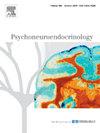音乐干预对压力的短期影响:一项多国集群随机试验的结果,使用唾液皮质醇和α -淀粉酶评估痴呆症养老院居民
IF 3.6
2区 医学
Q2 ENDOCRINOLOGY & METABOLISM
引用次数: 0
摘要
目的:压力会对痴呆症患者的幸福感和生活质量产生负面影响。我们的研究探讨了音乐作为一种潜在的减压策略,对25个养老院单位的痴呆症和抑郁症患者的影响,这些养老院单位包括在多国集群随机对照试验中,音乐干预老年痴呆症和抑郁症(MIDDEL)。方法:团体音乐治疗包括以小组为单位演唱知名歌曲和怀旧歌曲,选择性地即兴演奏乐器并随着音乐移动。唱诗班的演唱包括10人一组( + )排练知名歌曲和新歌。在第1、3和6个月,对183名护理院居民进行集体音乐治疗(n = 55)、休闲合唱团演唱(n = 72)或读书(n = 56)之前10 分钟、之后15和60 分钟的唾液样本采集,并进行压力视觉模拟量表。结果:1014份唾液样本中,671份(66 %)可用于α -淀粉酶检测,633份(62 %)可用于皮质醇检测。研究组的唾液皮质醇、α -淀粉酶和主观应激在治疗前后发生了显著变化,但研究组之间没有发现显著差异。结论:包括音乐治疗在内的团体干预对老年痴呆症患者的压力水平有积极的影响。痴呆症患者参与的程度或强度可能在音乐对压力的影响中发挥作用。研究结果表明,无创收集痴呆症患者唾液是可行的。未来在这一人群中的研究应考虑提高数据有效性的策略,如刺激唾液流动。ClinicalTrials.gov注册编号:NCT03496675。本文章由计算机程序翻译,如有差异,请以英文原文为准。
The short-term impact of music interventions on stress: Results of a multinational cluster-randomized trial using salivary cortisol and alpha-amylase assessments in care home residents with dementia
Objective
Stress can have a negative impact on well-being and quality of life in people with dementia. Our study explored the effect of music as a potentially stress-reducing strategy in care home residents with dementia and depression of 25 care home units included in the multinational cluster-randomized controlled trial Music Interventions for Dementia and Depression in Elderly care (MIDDEL). Methods: Group music therapy consisted of singing well-known songs and reminiscence in small groups, optionally improvising on instruments and moving to music. Choir singing consisted of rehearsing well-known and new songs in larger groups of 10 + participants. During month 1, 3, and 6, saliva samples were collected 10 min before and 15 and 60 min after a session of group music therapy (n = 55), recreational choir singing (n = 72) or a book reading (n = 56) in 183 care home residents, along with a stress visual analogue scale. Results: Of 1014 saliva samples collected, 671 (66 %) were valid for alpha-amylase assay and 633 samples (62 %) for cortisol assay. Significant pre/post session changes were found for salivary cortisol, alpha-amylase, and subjective stress within study arms, although no significant difference was found between study arms. Conclusion: Group interventions, including music therapy, can have a positive impact on stress levels in care home residents with dementia. The level or intensity of participation required from the person with dementia may play a role in the impact of music on stress. Findings indicate it is feasible to collect saliva in persons with dementia non-invasively. Future studies in this population should consider strategies to improve validity of data, such as stimulating saliva flow. ClinicalTrials.gov registration NCT03496675.
求助全文
通过发布文献求助,成功后即可免费获取论文全文。
去求助
来源期刊

Psychoneuroendocrinology
医学-精神病学
CiteScore
7.40
自引率
8.10%
发文量
268
审稿时长
66 days
期刊介绍:
Psychoneuroendocrinology publishes papers dealing with the interrelated disciplines of psychology, neurobiology, endocrinology, immunology, neurology, and psychiatry, with an emphasis on multidisciplinary studies aiming at integrating these disciplines in terms of either basic research or clinical implications. One of the main goals is to understand how a variety of psychobiological factors interact in the expression of the stress response as it relates to the development and/or maintenance of neuropsychiatric illnesses.
 求助内容:
求助内容: 应助结果提醒方式:
应助结果提醒方式:


